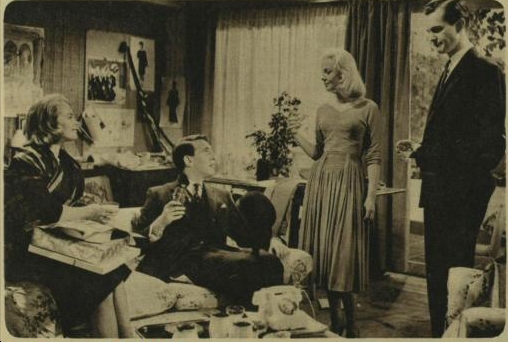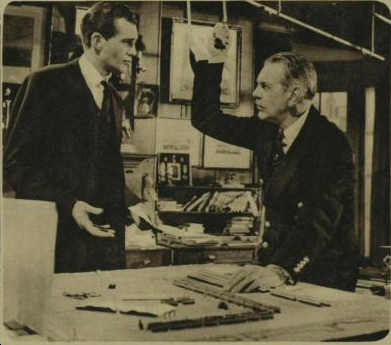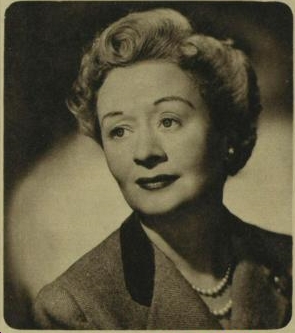Up Guards and at 'em!
By Alan Dent
Illustrated London News
Saturday, October 28, 1961
pg. 742; Issue 6378

A scene from The Queen's Guards, Susan, a model (Elizabeth Shepherd) shares a flat with Ruth, a dress designer (Judith Stott). Susan's boy friend, John (Daniel Massey), a Guards officer, is annoyed when Susan makes a pass at his friend, Henry (Robert Stephens). |

John Fellowes (Daniel Massey) talks to his father, Captain Fellowes (Raymond Massey) about his brother's death. From The Queen's Guards, produced and directed by Michael Powell. |
What does the young guards officer, taking over his first responsible position in the "Trooping of the Colour" ceremony, think about? My own idea - amounting to a conviction - is that he thinks the entire time about exactly what he has to do in that fixed time, what orders he has to give at precisely which moment. He must stay attentive lest there should be the slightest possible hitch in his own or in anyone else's behaviour. He must also stay as cool as the heavy bearskin on his head allows. He must, in short, be utterly intent on his all-important and integral job.

Alan Dent writes: That delightful actress, Ursula Jeans, contributes the best piece of acting in Michael Powell's intensely military film, The Queen's Guards, which began its London career at the Carlton on October 11. Miss Jeans plays the wife and mother of a retired Grenadier Guards officer and his Guards officer son (played respectively by Raymond and Daniel Massey, who are actually father and son). She acts so expressively that one realises only when the film is over that her author has given her the minimum of help. And that the creation of this character - full of pride and sorrow, courage and integrity - is largely due to the actress's own resources. |
All kinds of dangerous little distractions are almost bound to occur. A passing fly may choose his particular nose to land on for a moment; he may, for this reason or some other, have an all but insurmountable longing to sneeze, or in some other way to stir out of his flawless immobility. He has, in short, to concentrate - to keep his mind, all of it, on the particular function he has to execute. His men watch him from behind, his superior officers watch him from in front, and his mother and sweetheart, his relatives and his friends, watch him from the grandstand. It is his finest peacetime hour.
He has to perform, and even to give the lead, in some complicated manœuveres which are not all in a day's work only. It is the Queen's official birthday, and our particular unit - in this particular film - has to do something called "leading the Sovereign's Escort" while his brother-officer "leads the escort to the Colour." He is, by the way Captain Fellowes of the Grenadier Guards, and his friend is Captain Wynne-Walton, and the two are respectively and wholeheartedly acted by two of our most copiously promising young actors, Daniel Massey and Robert Stephens.
The point of this preamble - which may seem unusually long even for me - is that young Captain Fellowes does not appear to have his mind on his work, though he carries out his orders and his commands without a flaw or a fidget. Instead, Michael Powell who made the film - it is called The Queen's Guards - appears to think that his young officer could conceivably spend this monumentous hour reviewing his own previous history and that of his military-minded family. This history we are given in a series of flash-backs, though we keep returning to the actual parade - the real thing, Sovereign and all - most beautifully and colourfully photographed. It may be that Mr. Powell is right. It may be that Roger Milner who devised the story and the screenplay is right. It may be that the "idea" of the film - contrived by Simon Harcourt-Smith - is a sound one. Let me only say that neither the notion nor the execution of it seems to me in the least right or sound.
But perhaps it does not greatly matter after all. The scheme - factitious or "contrived" as it seems to me - does certainly permit us to see the Guards in both peace (on parade) and in war and the preparation for war (in retrospect). It shows us both the toy soldiers and the real soldiers. The claims of the film's synopsis are reasonably fair for once: "It reveals the men behind the glamorous uniforms, shows how they are trained and the kind of work they are expected to do. It shows the private live of the Guards, in love an war." Well, at least it makes an attempt and a fine display.
Raymond Massey and Ursula Jeans (the latter with a considerably underwritten part) play our young hero's parents - one an old invalided bore, the other a mother still grieving for a son killed in the war. Elizabeth Shepherd and Judith Stott (the latter, as always, rewarding to watch) are the two sisters who are wooed by our two young officers. Ian Hunter offers a capital and convincing study of the father of the girls - the kind of man who expostulates at the parade, and goes so far as to call the officers of a crack regiment a shower of snobs (the cad!) Anthony Bushell - without whom no film about the British Army can be called complete - has a single superbly right appearance as a Major, both beaming and authoritative, who has to rebuke and punish our two young heroes for coming to blows in the officers' mess. And the Mounted Band of the Blues and the Massed Bands, Drums and Pipes of the Brigade of Guards playing all those greatly endeared old marches, quick and slow, move me personally very much more than all the parade, the sentiment, the glow, the valour, and the glory.
Back to index




